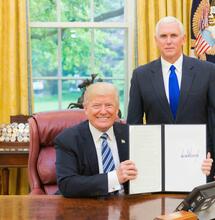What does the MORE Act Mean for Legalisation?

The U.S. House of Representatives just passed the MORE Act, which would end the federal prohibition of marijuana, on a vote of 220 to 204. What does this mean, though? Let me break it down for you.
The House of Representatives passed the MORE Act, which would end the federal prohibition of cannabis. But in the U.S. system, a bill does not become law until both the House and Senate pass it. Following this, the President has to sign it.
The MORE Act will now go to the Senate, where it faces a challenging ride.
The House passed the MORE Act back in late 2020, but the bill failed in the Senate. This new version of the MORE Act is nearly identical to the one that passed the House in late 2020.
The MORE Act would release cannabis from the federal Controlled Substances list. It would put a 5% federal tax on cannabis and allocate small business and equity licenses revenue. It would also retroactively erase individuals' records for past cannabis-related offences.
Will the MORE Act pass in the Senate this Time?
It is possible but sadly unlikely. The MORE Act would need 60 votes to pass. That would include all 50 Democrats and at least 10 Republicans. Following the passing of the MORE Act in the House of Representatives, Representative Jerry Nadler (D-NY) voiced his frustration with the Senate's nonaction on cannabis reform. "Sometimes, I think we'd better off if we didn't have the Senate."
Do the People want Legalisation?
According to the latest Gallup poll, 68% of Americans back cannabis legalisation. Eighteen states have legalised recreational cannabis for adults, and 38 states have legalised medical cannabis.
Republicans are more cautious than Democrats about legalising cannabis for recreational use: 47% of Republicans and Republican-leaning independents favour legalising cannabis for both medical and recreational use. An additional 40% say it should only be legal for medical use.
Congressman Steve Cohen (D-TN) said that Congress needs to get moving.
"It's no secret that the war on drugs failed…Marijuana is less dangerous than alcohol…Congress has been out of step on this issue. It's called 'cultural lag.' We're finally coming around to re-scheduling it from Schedule 1, where it's in a class with heroin and methamphetamines, which is absurd…We must re-schedule marijuana. We must decriminalise it at the federal level. Now is the time to do some remedies to federal marijuana laws. This is an historic time. Let's move forward and do the right thing."
Would Legalising Cannabis Cost the Taxpayers Money?
In a word. No. Budget analysis estimates the MORE Act would generate $8.1 billion in tax revenue in just ten years. It would also reduce federal prison expenses by $800 million in the same time frame.
What is the Senates' Problem?
House members are generally younger and more socially aware and comfortable with cannabis. They represent smaller districts and face re-election every two years. Because of this, they're tighter with their constituents and what they want.
In contrast, Senators are older, more stuck in their ways, and much less accountable to voters as they only face re-election every six years. Generally, senators are far less comfortable with legalisation, mainly as cannabis has been tarred as a dangerous plague for most of their lives.
A Guide to the MORE Act
The MORE Act would make several meaningful changes to federal cannabis policy, including:
- Enabling the expungement of low-level federal cannabis convictions. Incentivising state and local governments to implement similar actions.
- Creating routes for ownership opportunities in the regulated industry for a diverse range of entrepreneurs and those who have been impacted negatively under prohibition.
- Allowing veterans to get medical cannabis recommendations from their V.A. doctors in states with an established medical cannabis program;
- Withdrawing the threat of deportation for immigrants accused of minor marijuana offences or gainfully employed in the legal cannabis industry.
- Providing essential reinvestment grants to communities that have suffered excessive rates of cannabis-related enforcement actions.
- Protects and respects consumers' rights and civil liberties under federal law regarding public benefits.
What's the Next Step for Federal Reform?
Senate Majority Leader Chuck Schumer (D-NY) and Sen. Cory Booker (D-NJ) have introduced an amended version of the MORE Act in the Senate. The Cannabis Administration and Opportunity Act.
Because the Senate Majority Leader created this bill, it is the most likely route to legalisation in the Senate. If Schumer can mobilise the votes to pass it, House and Senate leaders will work to harmonise the two bills.
Joe Biden is no fan of cannabis legalisation. Having written some of the nation's most draconian drug laws during the 1990s. He would have to sign the bill for it to become law. The last hurdle would be the President.















